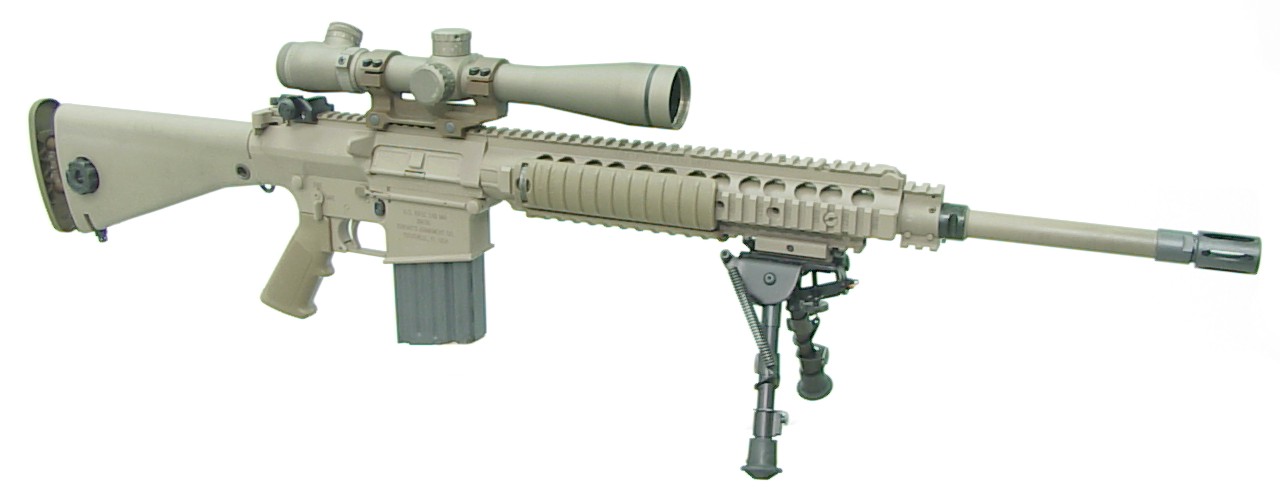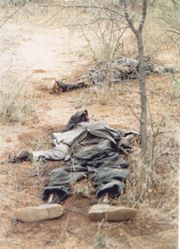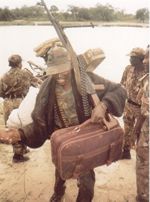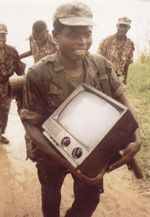Editor's note: WorldNetDaily international correspondent Anthony C.
LoBaido has traveled extensively in Southern Africa during the past
decade. His articles on Rhodesia/Zimbabwe,
the
South African Apartheid Mercenary Army Executive Outcomes and the
Christian, anti-Marxist Angolan rebel group UNITA have documented the
West's support for tyrannical regimes throughout Southern Africa. In this
report, LoBaido brings together more evidence of the lies and betrayal
that characterize the region.
By Anthony C. LoBaido
© 2000, WorldNetDaily.com
Read most Western news reports about what's happening in Angola and the
story seems clear: The Angolan government officials wear white hats. The
forces under the command of UNITA rebel leader Jonas Savimbi wear black
hats.
But reports on the ground from independent sources contrast sharply
with the official news filtered through the lenses of the United Nations
and the despotic Angolan regime.
A missionary group, for instance, charges that atrocities committed by
the Angolan government are being systematically covered up -- atrocities
including the systematic assassination of political rivals, the forced
recruitment of children into the military and the suppression of all
meaningful dissent, including the jailing of journalists.
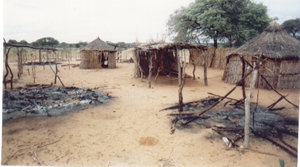 |
| Results
of the Angolan government's soldiers scorched earth policy in
southeastern Angola. Photo courtesy of the Windhoek Observer. |
Frontline Fellowship was founded by former South African Special Forces
reconnaissance man Peter Hammond. Its relief projects and missionary work
have grown dramatically over the past decade.
"We try to bring the Gospel to the front lines of the war areas.
We try and bring in Bibles, clothing and medical supplies as well,"
said Hammond. "In the Sudan, we've had to breach the United Nations
ban on bringing in Bibles to the persecuted
black South Sudanese Christians."
Frontline Fellowship is in a unique position to document the
"facts on the ground" in Southern Africa, especially as they
relate to the Christian, anti-communist black people living in South
Africa, Angola, Namibia, Zimbabwe and Sudan.
"By mid-1998, the precarious peace formulated between the MPLA
Angolan government and UNITA at 1994 Lusaka Peace Protocol began to
crumble," explains Frontline Fellowship's field director Robert Zins.
"In the 'popular media,' most blamed UNITA for the resumption of open
hostilities. Yet the media were virtually united in their failure to
report on the MPLA government's atrocities carried out during its campaign
to extend centralized administration into territory which had been under
UNITA administration."
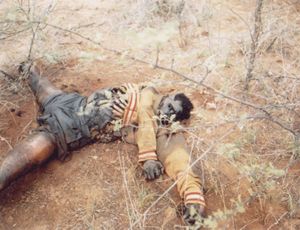 |
| Civilians
murdered by Angolan government soldiers. Photos courtesy of the
Windhoek Observer. |
Zins explained that it was not uncommon for the MPLA to identify people
with UNITA sympathies and have them murdered, hence removing any future
political opposition.
"The MPLA perpetrated such acts between 1996 and mid-1998,"
said Zins. "By such a practice, the MPLA demonstrated that it was not
trustworthy and that its only intention was to eliminate its political
rivals and maintain a monopoly of power. Under those circumstances, UNITA
resumed its armed resistance."
But that's not the story being told in the West.
"Calls for a peaceful resolution to the Angola crisis were
disregarded and notable individuals, such as Richard Holbrooke, United
States ambassador to the United Nations and Peter Hain, minister of state
at the British Foreign Office have come out in full support of the MPLA
government," said Zins. "Hain has been globetrotting to rally
support for the MPLA government, and to vilify UNITA, and particularly its
leader Jonas Savimbi as being exclusively responsible for the breakdown of
the Lusaka Protocol."
Indeed, on Nov. 19, 1999, the BBC aired a statement by Hain, in which
he compared Savimbi with Saddam Hussein and Slobodan Milesovic.
However, Mick Lanigan, a British official, rebuked Hain for having such
a narrow perspective of the Angolan crisis and reminded him that "the
oil revenue of Angola is being future traded out of London" and
"that only a small percentage of that revenue is getting back to
Angola. ... As recorded in both the international and British media, a
huge proportion of this revenue is being siphoned off by President Santos
and his ministers."
The UK recently offered Savimbi asylum in England, promising him
freedom from prosecution and the chance to hold on to a great deal of his
wealth if he hands over UNITA's diamond and oil fields to the MPLA and
British multinational interests.
The MPLA also stands accused of engaging in the forced recruitment of
child soldiers.
According to the Namibian Society for Human Rights, based in Windhoek
(the German word for "The Windy Corner"): "Namibian and
Angolan authorities have often collaborated in the rusga (forced
recruitment) on Namibian soil of hundreds of Angolan youths who fled from
military conscription into Forcas Armadas Angolanas, the armed forces of
Angola, in order to fight against UNITA movement in that country."
In mid-December, Marxist Namibian and Angolan forces conducted a joint,
major sweep throughout the townships in the vicinity of Rundu, arresting
many people, especially males (including under-aged youths), for failing
to produce Namibian identity documents. Human rights monitors reported
that close to 1,000 Namibians, and possibly Angolan citizens, were being
held under unhygienic and inhuman conditions in what looked like a
concentration camp.
"That the detainees were not in possession of Namibian identity
documents was not entirely their fault, as the Ministry of Home Affairs
has so far been unable to provide all Namibians with proper
documents," explained Zins.
On suspicion that they were UNITA soldiers, men were handed over to
Angolan soldiers.
"Namibia openly allies itself with the MPLA government against
UNITA," said Zins. "In December 1999, the Namibian government
permitted MPLA Angolan government forces, Forcas Armadas Angolanas, to use
Namibian soil to launch its attack against UNITA-held territory in
southeastern Angola. During that cross-border bombardment, some FAA, NDF,
and SFF soldiers crossed the Kavango River into the nearby Angolan
villages where they allegedly started beating up civilians and pillaging.
"
Looting is a popular pastime of the FAA. After numerous such attacks,
"booty" was carried back to Namibia. The Windhoek Observer
published photographs, reproduced here, of FAA soldiers crossing the
Kavango River back into Namibia. With big smiles, they were shown carrying
mattresses, television sets and other household goods and being greeted by
smiling Namibian policemen in camouflage uniforms. The FAA soldiers sold
the looted property in Namibia.
Having been trained by Executive Outcomes elite mercenaries from the
now-defunct South African Special Forces, the MPLA's FAA has been
conducting a scorched-earth campaign in southeastern Angola.
According to eyewitnesses, FAA soldiers recently swept through the
rural areas along the Namibian-Angolan border, leaving in their path
burned huts, destroyed villages and the bodies of civilians who apparently
had been executed in cold blood.
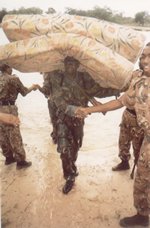 |
| These
four photos depict Angolan MPLA government soldiers crossing back
into Namibia, across the Kavango River, after they have just
looted a town in southeastern Angola. Photos courtesy of the
Windhoek Observer. |
"We have heard reports that the people the Angolan army thinks are
UNITA, it just eliminates" said Phil ya Nangoloh, the executive
director of the Windhoek-based National Society for Human Rights. Also
according to ya Nangoloh, local Namibian TV aired a brief news piece that
featured an Angolan FAA soldier saying, "We came here to kill, to eat
and to assassinate."
In cold blood
More terror is continuing to spread in northern Nambia, says Zins.
"In December of 1999, several FAA soldiers entered Namibia at
Cuangar in order to buy drinks and to sell goods stolen from refugees
fleeing intensified fighting in southern Angola," he said. "One
of the FAA soldiers accused a man named Antonio Jacob of being a UNITA
agent. While standing on Namibian soil, Mr. Jacob, a Namibian citizen, was
bayoneted in the heart by Angolan FAA soldiers in the presence of Namibian
authorities. This outrageous execution perhaps portrays methods which the
Angolan FAA soldiers operate against unarmed detainees within Angola who
are suspected of being sympathetic to UNITA."
Amazingly, despite its atrocities, the MPLA government continues to
receive international support. On Jan. 18, the three observer nations to
the Angolan Peace Process (Portugal, the Russian Federation and the United
States -- a.k.a "the Troika") issued a statement reaffirming
their view that UNITA under the leadership of Jonas Savimbi was "the
primary cause of the continuing conflict in Angola."
Paragraph seven of their statement reads as follows: "Members of
the Troika condemn UNITA's ongoing attacks on civilian populations within
the Republic of Angola and note with grave concern the escalation of the
fighting into Namibia. The Troika calls upon UNITA fighters to lay down
their arms and encourages the government of Angola to provide mechanisms
for the demobilization of former UNITA combatants."
Ya Nongoloh is not impressed.
"As long as the members of the so-called Troika of Observer
States, namely the United States of America, Portugal and Russia, are
themselves actively involved in the pillaging of Angola's resources, there
will be a conflict of interest," he said. "The Troika condemns
the human rights violation by UNITA upon innocent civilians, [but] human
rights monitoring organizations in this region, hold the view that the
lion's share of very serious human rights violations such as massacres,
summary executions, enforced disappearances and torture both in Angola and
along the northeastern border of Namibia are perpetrated by Angolan
government forces."
It is interesting to note that Portugal is the former colonial ruler of
Angola, that Russia has waged a massive war against UNITA -- sending
billions of dollars in arms and manpower to the MPLA -- while the U.S.
behind President Clinton's anti-UNITA executive order can hardly be called
impartial observers.
Zins told WorldNetDaily that the National Society for Human Rights in
Namibia has now come under the most vicious of verbal attacks.
For example, On Dec. 23, the Namibian Broadcasting Corporation program
Ewi lyaManguluka (Free Voice) contained a vicious attack against NSHR and
against Phil ya Nangoloh personally. The female talk show host incited
listeners by calling Phil ya Nangoloh an "enemy of the people"
and "a habitual liar."
Worse still, on Jan. 13, a male caller on Free Voice "called upon
Namibian Defense Force (NDF) soldiers, "especially ex-PLAN fighters,
to use the rules of war to take drastic steps against the human rights
organization."
Zins points to the arrest of Angolan journalist Rafael Marques at his
home in October. He was accused of "defaming" MPLA President
Eduardo dos Santos, by referring to him as a dictator in a July 3, 1999,
article in an Angola newspaper called Agora.
The article, entitled "The Lipstick of Dictatorship," said
that dos Santos was "responsible for the destruction of the country
and the promotion of corruption." For his part, Marques was
incarcerated for 41 days before he was informed of the charges against
him. He was released on bail with instructions not to leave the country.
Marques' plight has been documented and taken up by Canada's
International Freedom of Expression Exchange. Yet that may not be enough
to save his skin. On Jan.19, a member of the Angolan parliament and member
of the ruling MPLA party, Mendes de Carvalho, issued a death threat
against Marques during a parliamentary debate.
Ironically, speaking during a debate on freedom of the press and
expression in Angola, de Carvalho stated that if Marques continued to
criticize the president of the republic, he would not live to the age of
40. Marques is 28.
"Can the MPLA tolerate a free press?" Zins asked
WorldNetDaily rhetorically.
Show me the oil money
Some suggest the reason for the international community's continuing
support for the Angolan regime in the face of such human rights abuses is
simple greed.
Foreign oil firms armed with big budgets are stepping up the pace in a
race for a dazzling offshore exploration off the coast of Angola. Analysts
say Royal Dutch/Shell and Chevron Corp are among frontrunners for
operatorship of the ultra-deep Block 34, where a giant reservoir is
believed to lie beneath the waves off southern Africa's west coast.
"There's quite a push by all the major oil giants," said an
industry analyst.
"We believe that Sonangol would like Shell to have an operatorship
in Angola," said Andrew Hayman of IHS Energy Group, referring to
Angola's state oil firm. Block 34, in 2,000 metres of water over 100 km
off Luanda, is just south of three similar blocks where operatorship was
snapped up last year by BP Amoco, Elf Aquitaine and Exxon Mobil.
"The eventual operator of the world-class opportunity would be
expected to pay the government more than $300 million in a so-called
signature bonus -- a one-off non-recoverable payment -- for the right to
operate the block," added Hayman. "Last year's total $900
million in payments for block 31-33 to the government helped fuel the
army's offensive against UNITA rebels led by Jonas Savimbi in a 25-year
civil war."
According to UNITA sources and interviews by WorldNetDaily with
Executive Outcomes personnel, ex-SADF soldiers and intelligence analysts,
Eduardo dos Santos has become one of the richest men in the world today.
This wealth is the result of the misappropriation of funds from the
Angolan nation -- revenues accruing from oil and diamonds from "Sanangol,"
the Angolan national oil company,
Sanangol, like Executive Outcomes, has its headquarters based in London
and is managed by British and Swedish personnel who are answerable only to
dos Santos.

